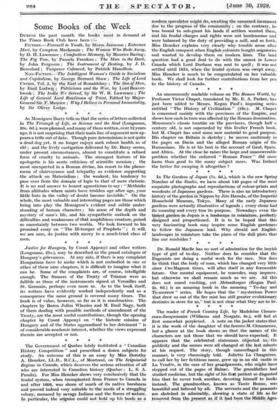Justice for Hungary, by Count Apponyi and other writers (Longmans,
21s.), may be described as the grand catalogue of Hungary's grievances. At any rate, if there is any complaint Hungarians have to make -which is not embodied in one or other of these nine chapters, it is difficult to imagine what it can be. Some of the complaints are, of course, intelligible enough. The framers of the Treaty of Trianon were as fallible as those of the instruments signed at 'Versailles and St. Germain, perhaps even more so. As to the boOk itself, its writers have evidently worked independently and as a consequence the same ground is covered many times. The book is of value, however, so far as it is constructive. The chapters by Baron Julius VVlassics and M. Emil Nagy, both of them dealing with possible methods of amendment of the Treaty, are the most useful contributions, though the opening chapter by Count Apponyi on " the historic mission of Hungary and of the States aggrandized to her detriment " is of considerable academic interest, whether the views expressed therein ire accepted or not.








































 Previous page
Previous page